
As officials with Hamas say they will respond “soon” to President Trump’s ceasefire proposal to end Israel’s nearly two-year war on Gaza, brokered with Middle East envoy Steve Witkoff, we look at the many other deals Witkoff and his family are involved with. A New York Times investigation reveals that when Witkoff, a real estate developer and longtime friend of Trump, began his new position as a diplomat in the Middle East, his son Alex took over his company, the Witkoff Group. Since then, not only has the Witkoff Group continued to ink major deals with investors in the Gulf Arab states, but the elder Witkoff has not even fully divested from the company. “There is no question that these relationships and these allegiances carry over between business and politics. … [T]he Witkoffs and other people in the administration may or may not be profiting personally from them while they are trying to do this work,” says Debra Kamin, who reported the story. We also speak to Kamin about turmoil in the Department of Housing and Urban Development under Trump.
Transcript
AMY GOODMAN: Officials with Hamas say they’ll respond soon to President Trump’s ceasefire proposal to end Israel’s nearly two-year war on Gaza. Meanwhile, on Wednesday, White House Press Secretary Karoline Leavitt reiterated President Trump’s timeline of three to four days for Hamas to agree to a deal and said any announcements would come from Trump and his Middle East envoy, Steve Witkoff.
During the briefing, Leavitt was asked why the administration believed it was appropriate for Trump’s son-in-law, Jared Kushner, to be involved in negotiations in the Middle East, given his financial ties to the region. This was part of Leavitt’s response.
PRESS SECRETARY KAROLINE LEAVITT: Virtually everyone in the world is supportive of this plan that Jared Kushner offered his time to help put together alongside our special envoy, Witkoff.
AMY GOODMAN: Trump’s Middle East envoy Steve Witkoff has said he’s very optimistic the U.S. peace deal will succeed.
Well, today we look at the many deals Steve Witkoff and his family are involved with, in a New York Times investigation headlined “As Witkoff Pitched Mideast Peace, His Son Pitched Mideast Investors.” It begins, quote, “As Steve Witkoff, President Trump’s envoy to the Middle East, conducted delicate cease-fire negotiations between Israel and Hamas this year, his son Alex was on another mission. He was quietly soliciting billions of dollars from some of the same governments whose representatives were involved in peace talks with his father,” unquote.
For more, we’re joined by one of the lead reporters on the piece, Debra Kamin, who covers the real estate industry for The New York Times.
Debra, thanks so much for being with us. I didn’t expect exposés on the Middle East envoy Steve Witkoff to come from the real estate reporter at The New York Times. But if you can start off by talking about how you got involved with the story and what you found?
DEBRA KAMIN: Yeah. Thank you. Thank you for having me.
So, this story actually is part of a body of reporting the Times has been focused on for several months with reporters from across the newsroom. At the beginning of the Trump administration, it became very clear to all of us in the newsroom and many people in America that we were facing a really unprecedented situation in terms of conflicts of interest in the administration. So the Times put together a team of reporters from all different departments to look into different officials in the administration.
I was tapped for that team, along with several of my very talented colleagues. And when it comes particularly to Steve Witkoff, the fact that he is a real estate developer, my real estate background was very helpful in that area, and I partnered with people in London and in New York and in Washington, and we’ve all been working together to really try to figure out how we can report on a situation that is unlike anything we’ve ever seen.
AMY GOODMAN: So, explain what the Witkoff real estate empire is and who it involves. If you can talk about Steve Witkoff, his son Alex?
DEBRA KAMIN: So, Steve Witkoff has been working in real estate for many, many years in New York City. His friendship with Donald Trump goes back to the fact that they both were real estate developers here in New York. They became friends in the ’80s. And in the late ’90s, Steve Witkoff formed his company, the Witkoff Group, which is now a very successful, very well-known real estate development company. And their special sauce is that they build fantastically successful apartments and condos, often taking over buildings that have been previously distressed and then turning them for profit. So, he has projects in Florida. He has projects in New York. They also have several projects abroad.
And when Steve Witkoff was tapped late last year to be the special envoy to the Middle East, he turned the company over to his son Alex, who is now running it. But as we learned in our reporting, Alex has been — for quite some time, been groomed to take over the company, and also, as we learned in our reporting, Steve Witkoff has not fully divested yet from the company, although he says he’s in the process of making that happen.
AMY GOODMAN: During a real estate forum in New York City in May, Steve Witkoff and his son Alex were questioned on stage by Amir Korangy, founder of The Real Deal and organizer of the conference. He asked about how Witkoff’s role as Middle East envoy impacts the real estate business of the Witkoff Group, which is now run, as you said, by Alex Witkoff.
AMIR KORANGY: When you call people, people recognize the name, and they recognize Steve. Is it easier to make those phone calls when you’re raising capital right now?
ALEX WITKOFF: I’d say, I mean, we’re not — we’re raising capital based on a 30-year crew. We’ve been doing business with major private equity firms, pension funds, banks for 30, 40 years. So it’s business as usual.
AMIR KORANGY: So, it hasn’t changed at all? I mean, I know you guys — the Park Lane Hotel recently sold to the Qataris. Like, that happened around the same time that, you know, Steve was going there. And I know he got a lot of hard press about that. But, obviously, it was — did there appear, like, any conflict there? Because people — it happened with the Kushners, too. You know, they were having a hard time with 666, and, you know, Jared goes into office, and then the Qataris come in and sort of purchase 666.
ALEX WITKOFF: Well, first off, they were part of that deal for many years before. As you know, they have a big debt business. They do a lot of — you know, they’re quite active. So they were part of that transaction for a long period of time. And part of the reason he was able to be so successful in Israel and the Middle East is because he had — we had been doing business in the Middle East for many, many years before, and those relationships allowed him to be successful in Israel.
STEVE WITKOFF: First of all, we were never partners with the Qatari Investment Authority on the Park Lane. We were partners with Mubadala. The Qatari Investment Authority foreclosed on a mezzanine loan against Mubadala and took it over. And so, we were never partners with the Qatari Investment Authority. With that said, I have a friendship and a great relationship with the prime minister of Qatar. His name is Sheikh Mohammed. I’m on record as saying that.
AMY GOODMAN: So, that’s Middle East envoy Steve Witkoff, and, of course, a well-known developer. Debra Kamin, can you explain what we just listened to?
DEBRA KAMIN: Yeah. So, Steve Witkoff and his son Alex were obviously asked some of the really hard questions about whether or not their real estate relationships and business with people in the Gulf, particularly in Qatar, have affected their relationships politically — Steve Witkoff’s relationships specifically have affected them politically. The line that they use is that they haven’t, that these things are separate. But at the same time, whether things are illegal is not the same as if — whether they’re unethical.
And if you are Steve Witkoff and you have a close relationship with the prime minister of Qatar, so close that he was at Alex Witkoff’s wedding in Palm Beach last year, and then you are sitting down with him, a friend of yours, who you also are in business with because he is an investor in a company that supports several of your projects, and then you also are sitting down with him in a peace negotiation, there is no question that these relationships and these allegiances carry over between business and politics.
That’s not necessarily always a negative. In many ways, there’s arguments to be made that Steve Witkoff was chosen for the role of Middle East envoy because he had these relationships. But it’s our job as reporters at The New York Times to show our readers where these conflicts of interest exist, and also show them where the Witkoffs and other people in the administration may or may not be profiting personally from them while they are trying to do this work, as they say, of diplomacy. It’s not as clean as I think they want often to cut it.
AMY GOODMAN: Well, you do point out that envoy Witkoff remains a partial owner of the company after selling a portion of his stake this year, so Steve Witkoff, as well as his son Alex, is profiting.
DEBRA KAMIN: Yeah, so, Steve Witkoff has — I mean, we received his financial disclosures as part of this reporting, and he has announced that he is in the process of divesting from his company. It was difficult to get clear information from the White House about his current status, but what we know at this point is that he sold a stake in the company for $120 million when he became envoy. And we know the White House has confirmed that he has not completed the process of divesting. These things can take time, but, yes, at this moment, he is still not fully divested from his company.
And Alex is running it, but Alex and Steve have relationships that overlap. They know many of the same people. They’ve traveled together. And as our reporting showed, they have been in relationship with the Qataris and other leaders in the Gulf for nearly a decade, and those relationships, at least from the Gulf side, there was a motivation in those relationships to encourage financial investment in Witkoff properties in order to build relationships with this family that they deemed as very politically connected, which is true. So, all that is important for us to report on, because it is a conflict of interest.
AMY GOODMAN: You write that Steve Witkoff and his other son, Zach, already face accusations of pushing ethical boundaries through their cryptocurrency venture with the Trump family, which also has been doing deals in the Middle East. If you can talk about what this cryptocurrency venture is, World Liberty Financial, and what you and your colleagues at The New York Times have been reporting?
DEBRA KAMIN: Yeah, sure. So, Steve Witkoff has two sons. He had three; one of his sons tragically died of an overdose many years ago. But he has two sons, Zach Witkoff and Alex Witkoff. And at this moment, Alex runs the real estate business for the company, and Zach runs World Liberty Financial, which is a crypto company, which they partnered with the Trump family.
And my colleagues, who are part of this large reporting team that was created in January, some of them focused on the crypto business, while I and other colleagues focused on the real estate business. And what they found in crypto is that Zach and the Witkoffs and the Trumps have built relationships with many people, particularly in the UAE, which have led to billions of dollars of investment in this crypto company. So, while Alex and his dad and their real estate company, we can trace deals that have benefited them financially through these relationships in the Gulf, Zach and his dad and the Trumps have benefited financially on the crypto side.
So you see a lot of enrichment in many different ways. And the question also comes: When are these things going to overlap? When are real estate and crypto going to be assets that you might purchase one with the other? There is definitely a plan here for more and more financial gain, without a doubt, from both Alex and Zach, and it’s clear that the relationships the family has have helped them make so much money in the first few months of this administration.
AMY GOODMAN: Do you see parallels with the Trump family? We interviewed Eric Lipton, your colleague at The New York Times. I mean, we’re talking about money made in the Trump family in the range of, well, well over $3 billion.
DEBRA KAMIN: “Billion” with a “B.” Yes, of course, we do. We also see parallels with Jared Kushner, with the Lutnicks. What you’re seeing now in Washington is a series of what we call sons profiting from their fathers. And whether or not laws are being broken, we don’t know, or we haven’t been able to really clarify that, but that’s not really the point of our reporting. You see Zach and Alex Witkoff. You see the Lutnicks. You see the Trumps running their dad’s business. You see Jared Kushner, who many of his real estate deals have profited from relationships he has in the Gulf, and now he’s also back in the diplomacy seat. There’s so much overlap, and there’s so much blurring of lines.
These are things that really were quite unheard of and quite scandalous just a few years ago, and it’s happening so frequently now that we’re starting to see it as normal. And it’s important, as reporters, that we continue to point out to our readers what this means for American negotiations, for our status in global diplomacy. This is all very, very unheard of and potentially a slippery slope, if we stop paying attention to it.
AMY GOODMAN: The Times of Israel is reporting that Steve Witkoff is expected to step down at the end of the year. Is that what you understand?
DEBRA KAMIN: I read that report, as well.
AMY GOODMAN: Well, let me ask you about another story that you’ve done, headlined “Two HUD Civil Rights Lawyers Dismissed After Raising Concerns About Fair Housing Act Enforcement,” about two HUD civil rights lawyers who were fired after raising concerns to members of Congress about how their jobs to enforce the Fair Housing Act had become nearly impossible in this administration. Can you explain what their jobs were, what the Fair Housing Act is, and what happened?
DEBRA KAMIN: Yeah, with pleasure, and I appreciate the opportunity to talk about it. Last week, just before our story on Steve Witkoff and Alex Witkoff was published, I had another investigation looking into the way that HUD, since the beginning of the Trump administration, has made it difficult for people within the Office of Fair Housing to enforce the Fair Housing Act.
And obviously, the Fair Housing Act is one of the key civil rights laws in our country, which makes it illegal to discriminate in housing, not just by virtue of race, but also if you need a wheelchair and you don’t have a ramp, or if you’re a single mom with kids and your landlord maybe they hate kids. These are all things that the Fair Housing Act protects all of us from, to make sure that when we go to find housing in America, we’re not discriminated against for any reason.
But laws are only as good as their enforcements. You know, you can say murder is illegal, but if police say they’re not going to go after murderers, that law stops really mattering. It’s the same for the Fair Housing Act. It has to be enforced for it to actually matter. And much of the enforcement happens in this Office of Fair Housing at HUD, which is staffed by lawyers and investigators who look into claims of discrimination, and if they find discrimination occurred, they hold those discriminators accountable. There’s often lawsuits, or there’s charges of discrimination, or there’s other ways that people are deterred from discriminating.
And since January, there have been a lot of changes at HUD brought down by the Trump administration, that many people within the group say has made it nearly impossible for them to do their job. And they blew the whistle. They released several internal documents and text messages and emails to me at The New York Times. They also wrote Senator Elizabeth Warren. And we had a big story on it. And lo and behold, a few days after our story, the two key whistleblowers who came forward to the Times were fired last week, and they were escorted out. One of them was put on administrative leave. The other one was fired. And they were escorted out of the office by staff, and security was present, as well. So, that was a very tragic turn of events for these people who are trying to help Americans understand that their potential to be protected is at stake.
AMY GOODMAN: Currently the HUD website is down, and when you go to it, HUD.gov, the website blames the looming — blames the shutdown on the left, on the radical left.
DEBRA KAMIN: Yes, the extreme — the extreme radical left. That’s correct. It’s very clear that this is — much of the work that was done by HUD and Fair Housing, which is not partisan, which is meant to protect all Americans, has become tainted by partisanship in this administration. And what I found in my reporting is that much of the enforcement work for the Fair Housing Act was being conflated with this anti-DEI push that Trump and his administration have been putting forth. And so, if you talk about DEI, you talk about diversity, equity and inclusion, those words, those are squishy words that can be applied to all sorts of things, and they are now being applied to ideas of discrimination and equal access to housing. That’s not the same as DEI, but in this administration, things are getting diluted and mixed up.
And clearly, at HUD, there is a desire to lean into this partisan politicking, and it’s causing people to lose their jobs. And it’s also making it so that people who have fair housing complaints are having trouble getting those taken seriously and finding relief for discrimination which is illegal.
AMY GOODMAN: Debra Kamin, we want to thank you for being with us, New York Times real estate reporter, whose investigation is headlined, “Where Mideast Envoy Pitched Peace, His Son Pitched Investors.” We’ll also link to your piece on the HUD workers who’ve been fired.
Next up, the award-winning journalist Mario Guevara faces deportation to El Salvador today, after he was arrested in June while live-streaming a “No Kings” demonstration. He’s lived in this country for over 20 years. Then we’ll speak with the actress Jane Fonda. Stay with us.
[break]
AMY GOODMAN: “Llama,” performed by MAKU in our Democracy Now! studio.


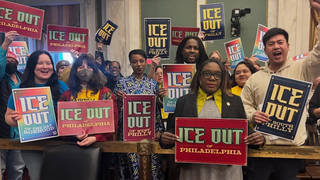
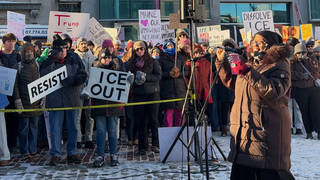
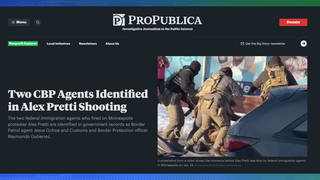





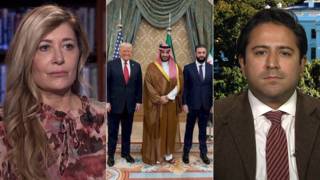

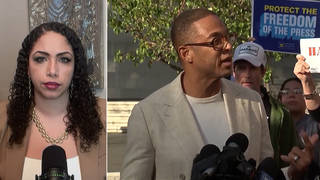
Media Options